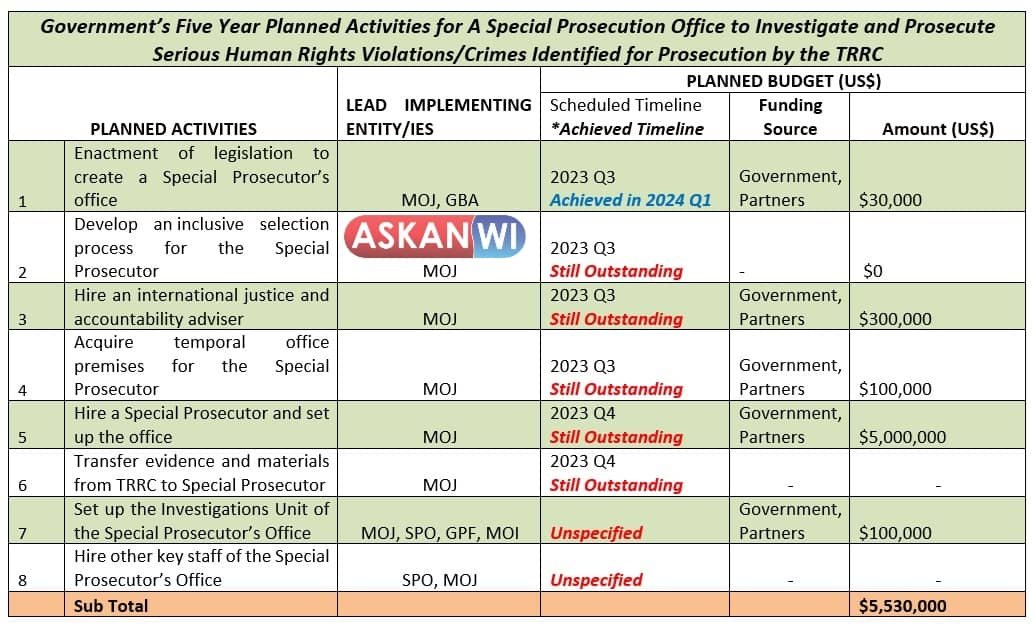How Committed is President Barrow’s Government in Progressing TRRC Prosecutions?
Justice Minister at Press Conference © Askanwi Media
By Edward Francis Dalliah and Yusef Taylor
Going into a transitional justice process after assuming office in 2017, President Adama Barrow’s government continues to tout it’s interest in prosecuting people alleged to have participated in serious human rights violations during the 22 years misrule of former President Yahya Jammeh. But just how much commitment has President Barrow’s government shown in completing tasks detailed in their Cabinet sanctioned Implementation Plan for the transitional justice process?
After former President Jammeh fled to Equatorial Guinea in early 2017, a Truth Reconciliation and Reparation Commission (TRRC), now defunct, was established by the National Assembly to investigate the human rights violations that occurred from 1994 to 2017.
According to the TRRC’s findings, both Gambians and other nationalities were unlawfully killed, detained, disappeared without a trace, and sexually harassed among other human rights violations under the orders of former President Jammeh. After its conclusion, a report was submitted to the government and most of its recommendations were accepted by President Barrow’s government including recommendations to prosecute individuals deemed to bear the most responsibilities for gross human rights violations and to ensure the “Never Again” mantra is established.
To establish this some of the recommendations call for the prosecution of some 69 perpetrators who orchestrated series of serious human rights violations in The Gambia.
Speaking as the Keynote Speaker at the opening ceremony of the 81st Ordinary Session of the African Commission on Human and People’s Rights (ACHPR) on Thursday 17th October 2024, Justice Minister Hon Dawda Jallow re-affirmed the government's commitment towards establishing a special tribunal for the prosecution of the perpetrators as highlighted in the TRRC report.
However, for these prosecutions to take place, certain legislations are required which, unfortunately, the Gambia does not have. Therefore, in fulfilment of this, the government has sought to establish a Special Tribunal in partnership with ECOWAS to prosecute these crimes.
Based on the Government’s Implementation Plan, a timeline of five years (2023 – 2027) has been drawn to work on a series of activities with a planned budget of $65,620,000. Some of these activities are highlighted below.
The table above shows some of the activities that the government intend to progress which will establish the necessary legislation and resources to commence prosecution. These activities are all under the theme “Justice and Accountability” and mostly scheduled for completion by the end of 2023. These observations are at the time of publication, 18th November 2024.
It can be seen that only one activity has been completed which is the enactment of a legislation to create a Special Prosecutor’s Office. Our inquiries with the National Human Rights Commission Unit responsible for tracking the implementation of the TRRC’s recommendation have reviewed and provided comments to improve the accuracy of the activity trackers shown above.
Our reporter reached out to the Ministry of Justice to confirm the information detailed above but they could not respond in time. Their response will be shared in future publications following the implementation of the TRRC’s activities and recommendations.
Our tracker highlights that seven out of the eight activities above are still outstanding. These include developing an inclusive selection process for the Special Prosecutor, hiring a Special Prosecutor and staff required to get the Office of the Special Prosecutor functioning.
Responding to a Parliamentary question from the Member for Banjul North, Hon Momodou L B Bah on 6th December 2023, the Justice Minister promised that “the Office of the Special Prosecutors should also be up and running by my own Policy target before the end of the first quarter [2024]. So, we have these timelines and guidelines in the work plan but you know this is government. Government business is difficult to operate entirely within the time but they’re there”.
However, we are now well into the third quarter of 2024 and the appointment of the Special Prosecutor has still not been appointed and announced by the Justice Minister.
Turning our attention to more activities under the same theme that should have completed by the end of 2023 shows that only two activities have been completed to date. These include establishing a joint task force between The Gambia and ECOWAS for the development of a framework for the judicial mechanism for prosecution and drafting the necessary texts for the establishment of the judicial mechanism.
On the other hand six other activities have not been completed which includes holding consultations on the proposed mentioned texts and signing and ratifying the text establishing the judicial mechanism. Domestication of the legislation or treaty establishing the judicial mechanism is still outstanding given that the documents have not been reviewed and an additional three other tasks which all have unspecified timelines are still outstanding.
In his remark at the ACHPR 81st Ordinary Session recently, Hon Jallow highlighted that “the Government of The Gambia, in collaboration with ECOWAS, is working towards establishing a special tribunal to address crimes against humanity, following the model of the Extraordinary African Chamber in Senegal”.
A recent FactChecks by Askanwi highlights that “the government is waiting for the ECOWAS [Commission] meeting in December [2024] to go through the processes”. And “if the proposal is listed on the agenda of the 66th Ordinary Session of the Authority of Heads of State and Government, a decision would be made to approve/reject Gambia’s proposal for a Special Tribunal”.



